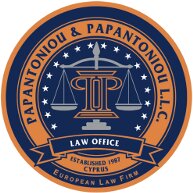Best Renewable & Alternative Energy Lawyers in Nicosia
Share your needs with us, get contacted by law firms.
Free. Takes 2 min.
List of the best lawyers in Nicosia, Cyprus
About Renewable & Alternative Energy Law in Nicosia, Cyprus
Renewable and alternative energy plays a vital role in Nicosia, Cyprus, as the city and the country work towards energy independence and reducing carbon emissions. Cyprus benefits from abundant sunlight, making solar power one of the leading renewable sources. The renewable energy sector in Nicosia includes solar, wind, and biomass projects, with significant government support and European Union directives encouraging further development. Legal frameworks regulate the production, distribution, investment, and consumption of these energy sources to ensure environmental protection and compliance with EU policy.
Why You May Need a Lawyer
Navigating the legal landscape of renewable and alternative energy in Nicosia can be complex due to evolving regulations, permits, and contractual obligations. Common situations where you may require legal assistance include:
- Applying for licenses or permits to develop a renewable energy project, such as a solar or wind farm - Drafting and negotiating Power Purchase Agreements (PPAs) or other supply contracts - Arranging project financing and investment agreements - Ensuring regulatory compliance with national and EU laws - Dealing with land use, zoning, and property rights issues for energy installations - Managing disputes between project developers, contractors, or regulators - Understanding tariffs, subsidies, and incentives available for renewable energy - Handling environmental impact assessments and related litigation - Protecting intellectual property related to innovative energy technology
Legal expertise ensures you comply with all legal requirements, avoid costly mistakes, and protect your interests in complex transactions or disputes.
Local Laws Overview
In Nicosia, renewable and alternative energy activities are governed by a mix of Cyprus national laws and European Union directives. Key aspects include:
- The Electricity Market Law, which regulates the production, transmission, distribution, and supply of electricity - The Law on Promotion of Renewable Energy Sources, supporting the expansion and integration of renewables into the energy market - The Energy Performance of Buildings Law, incorporating energy efficiency standards - Licensing requirements overseen by the Cyprus Energy Regulatory Authority (CERA) - Environmental laws requiring project developers to conduct environmental impact assessments - Incentives, feed-in tariffs, and grant schemes aimed at encouraging private and commercial investment - Zoning and planning regulations settling where and how renewable installations can be built - Compliance with EU targets for renewable energy share and emissions reductions, including reporting and monitoring obligations
These laws create a structured environment but require careful navigation to ensure compliance and opportunity maximization.
Frequently Asked Questions
What types of renewable energy projects are most common in Nicosia?
Solar photovoltaic installations are the most common due to the island's sunny climate. Wind energy and small biomass projects are also present.
What permits do I need to develop a solar energy project?
You will need a license from the Cyprus Energy Regulatory Authority (CERA), environmental approvals, and local planning permissions.
Are there financial incentives for investing in renewable energy in Cyprus?
Yes, the government offers grants, feed-in tariffs, and tax incentives for certain renewable energy projects subject to eligibility and application.
How are renewable energy tariffs determined?
Tariffs are regulated and set by CERA, taking into account project type, capacity, and prevailing market policies.
Can residential properties install solar panels without a commercial license?
Small-scale installations for self-consumption generally require simpler notification procedures rather than a full commercial license, but still need approvals.
How is land use regulated for renewable energy installations?
Land use and zoning laws restrict where installations can be built. The local planning authority must approve large projects to ensure minimal impact.
What is the role of the Cyprus Energy Regulatory Authority?
CERA oversees granting licenses, monitoring compliance, setting tariffs, and ensuring fair competition in the energy market.
What happens if I do not comply with renewable energy regulations?
Non-compliance can result in fines, loss of licenses, forced project shutdowns, or even civil or criminal legal actions.
Are foreign investors allowed to own and operate renewable energy projects?
Yes, Cyprus law permits foreign ownership, subject to compliance with all licensing, regulatory, and corporate laws.
How do I resolve disputes with authorities or contractors?
Disputes may be settled through negotiation, mediation, or formal legal proceedings in Cyprus courts or under arbitration clauses in contracts.
Additional Resources
For those seeking support and information, the following resources and organizations can be helpful:
- Cyprus Energy Regulatory Authority (CERA): Licensing and compliance information - Ministry of Energy, Commerce and Industry: Policy and regulatory updates - Cyprus Institute of Energy: Technical and educational support on renewables - Cyprus Employers and Industrialists Federation (OEB): Industry advocacy and networking - Local Environmental NGOs: Updates on environmental aspects and legal compliance
Next Steps
If you need legal advice regarding renewable and alternative energy in Nicosia, start by documenting your project details, objectives, and any correspondence with authorities. Then, identify law firms or legal professionals with expertise in energy and environmental law. Prepare your questions and gather relevant documentation to facilitate an efficient legal consultation. A specialized lawyer can guide you through regulatory compliance, prepare required applications, and represent your interests in negotiations or disputes, ensuring your investment or project operates smoothly within the legal framework of Cyprus.
Lawzana helps you find the best lawyers and law firms in Nicosia through a curated and pre-screened list of qualified legal professionals. Our platform offers rankings and detailed profiles of attorneys and law firms, allowing you to compare based on practice areas, including Renewable & Alternative Energy, experience, and client feedback.
Each profile includes a description of the firm's areas of practice, client reviews, team members and partners, year of establishment, spoken languages, office locations, contact information, social media presence, and any published articles or resources. Most firms on our platform speak English and are experienced in both local and international legal matters.
Get a quote from top-rated law firms in Nicosia, Cyprus — quickly, securely, and without unnecessary hassle.
Disclaimer:
The information provided on this page is for general informational purposes only and does not constitute legal advice. While we strive to ensure the accuracy and relevance of the content, legal information may change over time, and interpretations of the law can vary. You should always consult with a qualified legal professional for advice specific to your situation.
We disclaim all liability for actions taken or not taken based on the content of this page. If you believe any information is incorrect or outdated, please contact us, and we will review and update it where appropriate.














